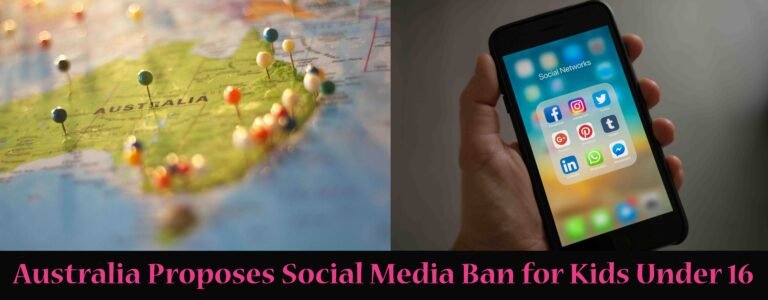In a bold move to protect children from the dangers of social media, Australia is considering a ban on platforms like Facebook, Instagram, and TikTok for users under the age of 16. This proposal aims to safeguard young people’s mental health and encourage healthier, more active lifestyles away from screens.
Why is Australia Proposing the Ban?
Prime Minister Anthony Albanese has called social media a “scourge” for young people. He expressed concerns about the negative effects that excessive social media use can have on mental health. Studies have linked high social media usage to problems like anxiety, depression, and body image issues in young people.
The government believes that restricting access to these platforms will allow children to engage more in real-life activities, like sports and outdoor play, instead of spending hours on their phones. Albanese also mentioned that the new law would help get children “back onto footy fields and in swimming pools,” promoting a more balanced and healthy lifestyle.
Key Points of the Proposal:
- Ban on Social Media for Kids Under 16: The new law would stop children from accessing platforms like Facebook, Instagram, and TikTok if they are under 16 years old.
- Age Verification Measures: Social media companies would be required to use stricter age verification to ensure children cannot easily bypass the system.
- Focus on Mental Health: The main goal is to reduce the mental health risks associated with social media use, such as cyberbullying, social pressure, and exposure to harmful content.
- Encouraging Real-Life Experiences: The ban is seen as a way to encourage children to interact more with the world around them, whether through physical activities, family time, or face-to-face socializing.
You can also like this: Snow in Saudi Arabia’s Al-Jawf Desert: An Unprecedented Winter Wonderland
How Would the Ban Work?
Currently, most social media platforms set a minimum age of 13 for users. However, these age restrictions are often ineffective because they rely on self-reported information, meaning children can easily lie about their age to access the platforms.
Under the new proposal, social media companies like Meta (Facebook, Instagram) and TikTok would have to implement more reliable age verification systems to prevent underage users from signing up. If the legislation passes, it could make Australia one of the strictest countries in the world regarding social media access for minors.
What Are the Benefits of This Proposal?
- Better Mental Health for Kids: With less exposure to social media, children may experience fewer mental health challenges such as anxiety and depression caused by online bullying and unrealistic beauty standards.
- Increased Physical Activity: By limiting screen time, children would be encouraged to engage in outdoor activities, improving both their physical and social well-being.
- More Family Time: Parents often worry about the negative impacts of social media on their children. This ban could give families more time to bond and create memories outside the digital world.
What Are the Challenges?
While the proposal has gained significant support, critics argue that enforcing an age limit on social media could be challenging. Children can easily bypass age verification systems by providing false information. Furthermore, some worry that the ban could limit children’s ability to learn about digital safety, technology, and online education.
Additionally, there are concerns about restricting children’s access to valuable online resources that help with learning, creativity, and socializing with peers in a controlled environment.
The Road Ahead
If the law passes, Australia could become a leader in the fight for online child protection, setting an example for other countries. However, the success of the ban will depend on how effectively it is implemented. The government will need to work closely with social media companies to ensure the new regulations are robust and enforceable.
Conclusion
Australia’s proposal to ban social media for children under 16 marks a significant step in the ongoing discussion about online safety. While the idea has its supporters and critics, it highlights the growing need to address the mental health risks associated with social media and provide children with healthier alternatives. As the legislation moves forward, it will be interesting to see how it impacts both the digital world and the lives of young Australians.




